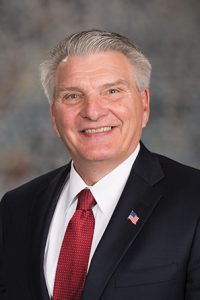Cash reserve budget bill advanced after cloture vote
Lawmakers gave first-round approval March 22 to the last of three main bills comprising the Appropriations Committee’s mid-biennium budget adjustment package.

The state budget is structured on a two-year basis, with the budget enacted during legislative sessions held in odd-numbered years. Adjustments are made during sessions held in even-numbered years.
The mainline budget bill and another measure that would authorize and provide certain fund transfers, create funds and change and eliminate provisions regarding a fund were advanced last week after successful cloture votes.
LB1013, introduced by Speaker Mike Hilgers of Lincoln at the request of Gov. Pete Ricketts, would change provisions relating to the state’s Cash Reserve Fund, also known as the rainy-day fund. Senators began general file debate on the bill March 17 and resumed March 22.
Gering Sen. John Stinner, chairperson of the Appropriations Committee, said the cash reserve serves a “dual purpose” for Nebraska.
“It serves, certainly, as an economic stabilizer for the state’s budget, but it also serves as a one-time source of funding for different projects,” Stinner said.
An Appropriations Committee amendment would use $513 million from the cash reserve for a variety of transfers outlined in bills introduced this session, including:
• $80 million to the Jobs and Economic Development Initiative Fund, from LB1023, introduced by Hilgers;
• $53.5 million to the Perkins County Canal Project Fund, from LB1015, introduced by Hilgers;
• $50 million to the Surface Water Irrigation Infrastructure Fund, from LB1074, introduced by Brainard Sen. Bruce Bostelman;
• $50 million to the Nebraska Rural Projects Fund, from LB788, introduced by Gordon Sen. Tom Brewer;
• $30 million to the Military Base Development and Support Fund, from LB1233, introduced by Bellevue Sen. Rita Sanders;
• $30 million to the Rural Workforce Housing Investment Fund, from LB1071, introduced by Gothenburg Sen. Matt Williams;
• $20 million to the Middle Income Workforce Housing Investment Fund, from LB1252, introduced by Omaha Sen. Tony Vargas; and
• $15.6 million to the state Department of Health and Human Services for construction, renovation and equipment replacement at Youth Rehabilitation and Treatment Center in Kearney, from LB792, introduced by Kearney Sen. John Lowe.
Among other provisions, the committee amendment also would set aside $175 million to be released to the Nebraska Capital Construction Fund for a potential new state penitentiary but would not appropriate those funds until certain conditions are met. Omaha Sen. Steve Lathrop offered a series of amendments to the bill to facilitate a discussion on criminal justice reform.
Lathrop said building a new prison, estimated at a total cost of $270 million for a 1,500-bed facility — an increase of 700 beds — would not solve the state’s prison overcrowding problem. Nebraska is at 152 percent of design capacity, he said, a situation that won’t be resolved by adding capacity alone.
A fiscally responsible policy also must include reducing inmate population growth through lowering some drug possession sentences and increasing opportunities for parole and programming, he said.
“Other states that have done this have solved the growth in their prison population,” Lathrop said. “They have saved money and they have not sacrificed public safety.”
Following approximately three hours of discussion Stinner offered a motion to invoke cloture, which ceases debate and forces a vote on the bill and any pending amendments and motions. The motion was adopted 39-4 and lawmakers then voted 40-3 to adopt the committee amendment.
LB1013 advanced to select file on a vote of 39-4.

